When the Logitech G Pro Wireless released a couple of years ago it took the gaming world by absolute storm. Within a couple of months it was the number one (or very close to it) most used mouse for pretty much all of our analyzed games, and it’s still insanely popular to this day.
Some might argue that that’s due to sponsorships, but we’ve seen plenty of players who aren’t sponsored by Logitech who swear by the mouse, and it’s not hard to see why. At the time of its release it was an insanely light wireless mouse with a very safe shape, great clicks and scroll wheel, reliable build quality, flawless sensor and a flawless wireless connection. It truly was ahead of its time, and that’s evidenced by the fact that other manufacturers took more than a full year to even announce competitors for the G Pro Wireless.
Today it’s time for the successor to ascend the throne. Will the G Pro X Superlight be as successful as its predecessor in times where the competition has caught up, or will the heir to the empire squander it all? Read our full review to find out all that and more.
At A Glance
Logitech G Pro X Superlight
Used by 388 players ()If you’re looking for an ultra lightweight wireless mouse with a safe shape this is a top option.
Pros
- Fits most hands and grip styles
- Good battery life
- Flawless wireless performance
- Lightweight
Cons
- Micro USB charging port
- High price
Specs
| Sensor | HERO |
|---|---|
| Polling Rate | 125 / 250 / 500 / 1000 Hz |
| Button Switches | Omron |
| Button Force | 65g |
| Connection | Wireless |
| Shape | Ambidextrous |
| Length | 12.42cm |
| Height | 3.96cm |
| Weight | 62g |
| Width | 6.06cm |
Usage Over Time In The Pro Scene
First Impressions
‘Cool, this one’s white’ was honestly my first thought. I remember a lot of people in the community going crazy over the fact that the Logitech G Pro Wireless Ghost (a white version) was a limited drop, so it’s cool to see that Logitech is now offering the G Pro X Superlight (I’ll sometimes refer to it as just ‘the Superlight’) in both a white and a black colorway. Do note that the GPW isn’t going to go away for now: that one will still be for sale, albeit at a reduced MSRP.
Aside from the impressive weight reduction, the removal of RGB elements, and the fact that there are no more side buttons on the right, not a lot has changed at first sight. Same scroll wheel, same shape, same side buttons, and so on. It’s when you flip the mouse over that you see some of the other major changes. Gone is the DPI selector button and away are the small-ish skates, in are big skates.
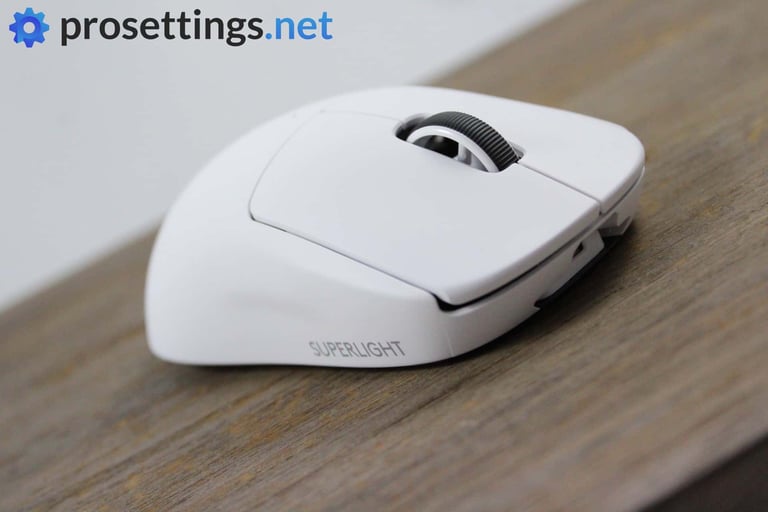
Long story short: Logitech cut out most of the stuff that players who gave them feedback didn’t use, which results in a weight reduction already, but they’ve also made internal tweaks to things like the PCB and what have you to achieve a much lighter weight overall. That weight is without a doubt one of the most noticeable things about this new one, but more on that later.
The G Pro X Superlight is a medium sized mouse with the exact same dimensions as its predecessor, the G Pro Wireless. That means that it has an extremely safe ambidextrous shape (sometimes lovingly called ‘the potato’ by the enthusiast community) but due to the removal of the right side buttons it’s no longer a truly ambidextrous mouse.
On my scale it comes in at 62 grams, which would already be light for a wired mouse. A wireless mouse with a rechargeable battery at this weight really does deserve the title of being super light as far as I’m concerned. This is an extraordinary feat by Logitech, and they managed to do it without cutting holes in the shell or compromising on shell integrity. More on that later on in the review, by the way.
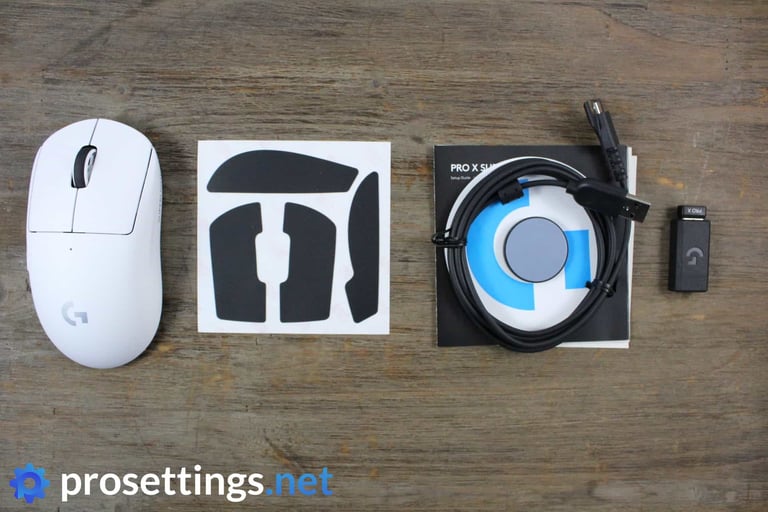
Something that might not be such a welcome change for some users is the fact that the DPI/profile selector button is now gone. I personally never used that but if you had multiple profiles saved for different games or use cases you’ll now have to swap between them in Logitech’s software. That’s not a huge issue but it is slightly less convenient than just pushing a button.
Before I go on I want to touch on something that doesn’t really have anything to do with the mouse real quick. Logitech says that this G Pro X Superlight is a certified carbon neutral product, which means that it’s using eco-friendly materials and production processes, effectively reducing the net carbon emissions to zero. This doesn’t change anything about the mouse but I love to see these big companies do their best to tackle these things. As an individual there’s only so much you can do for the environment (which doesn’t mean you shouldn’t bother) so whenever a large corporation steps I always applaud that. Good on you, Logitech.
Packaging
The Superlight comes in the same type of box as the GPW, meaning that I started the unboxing experience thinking that I would know exactly what was inside: the mouse, some documentation, the USB receiver, the charging cable, and a little extender to allow you to put the receiver closer to your mousepad.
And I was right. All of this was in the box. I was also wrong, since there was more. I also found a replacement ‘puck’ for your mouse that has a skate attached to it and there’s some grip tape for both sides of the mouse and the main buttons. That’s impressive. Seems like Logitech wants to upgrade their ‘flagship mouse experience’ and I have to say that I’m all for it. I’ll go deeper on these extras further on in the review but I just wanted to say how cool I think it is that they included this.
Sadly they didn’t exactly go the whole nine yards because I didn’t find any replacement mouse feet in the box. For mice that are aimed at competitive gamers that’s always a plus as far as I’m concerned, so it’s a bit of a shame that they didn’t include a pair of extra skates.
Shape, Coating, and Mouse Feet
Those who know the G Pro Wireless (or any of its clones) know what to expect here since it’s more of the same. The Superlight has an extremely safe ‘one shape fits all’ kind of design, with no awkward or sudden curves anywhere on the mouse. The hump is concentrated towards the middle but it’s very gradual, making it extremely easy to get used to. I know that not everyone likes these kinds of super safe designs, and it’s not my absolute favorite shape either (it’s a bit too ‘general’ for that) but I definitely have no issues using this for longer periods of time.
One quirky little detail is that tiny ridge on the right side of the mouse where the side buttons used to go. It’s noticeable from some angles but I don’t really feel it at all so it’s not like it’s annoying. I also don’t think it’s a ‘feature’ though: it’s so small that it doesn’t exactly provide support and it’s placed in a spot where it doesn’t help with picking up the mouse either, unless you’ve got a really strange grip. I think it’s a remnant of the old side buttons, but that’s just me. It’s nothing to worry about anyway.
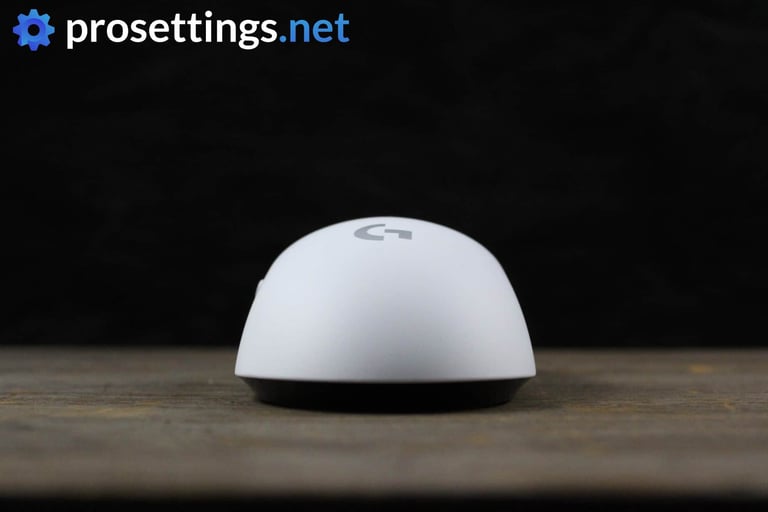
As far as the coating goes it doesn’t feel like a lot has changed, but that’s okay to me. I quite liked the coating of the GPW and I like this one too. The matte white feels almost a bit chalky to the touch and it performs great for my mildly sweaty hands. As an added bonus it does a great job at handling sweat and oils for me, so the coating definitely does what it has to do without any issues at all.
A bit about the grip tape then: I’m impressed. It’s very, very grippy, but what’s more impressive is just how thin it is. I’m normally not a big fan of tape because it can drastically alter the way a mouse feels in my hand but this is so thin that I’d have no issues placing it on my Superlight permanently.
I did end up taking the tape off because for me personally the mouse works perfectly ‘naked’ but if you want that extra bit of grip you can rest assured that this will do the trick. Do watch out when removing it though. You can easily do so without leaving any residue on the mouse, but since the tape is so thin you can stretch it out if you try to pull it off with too much force, so be gentle if you’re planning on reusing it.
And now the bottom’s up: that’s where we’ll find the new and improved ‘zero-additive PTFE feet.’ The feet that were on the G Pro Wireless were basically fine when that mouse came out, but in this day and age people expect better, and Logitech listened. Because smaller skates can dig into a mousepad when a lot of pressure is applied (this could happen when you’re controlling recoil in a tense battle or something like that) Logitech opted to go for larger ones this time in order to achieve maximum consistency.
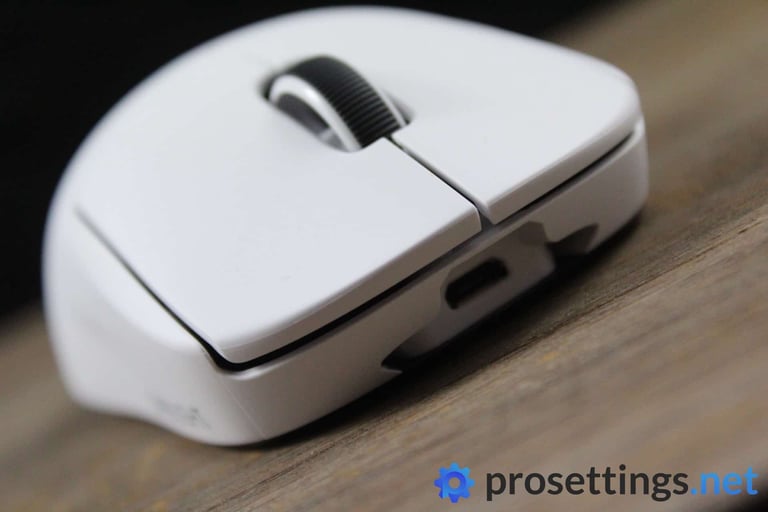
These unconventionally formed skates are nicely rounded and provide a scratch-free and smooth glide straight out of the box. I ended up going for the version with the big and round ‘skate puck’ on the bottom because I felt like I preferred that one over the non-skate puck version but honestly the difference (to me) was extremely minimal.
Recommended Grip Types
As I said before this is a very safe type of shape. Logitech made it based on the feedback of a lot of professional players so while it is kind of a ‘neither here nor there’ type of shape it does fit an extremely wide variety of grip types and hand sizes. I’d go so far as to say that all grip types should work here, depending on your hand size of course.
For pure fingertip grippers it might be a bit too high, but as always this section is just a bit of a guideline. There’s not a single reviewer out there who 100% knows what your preferences are (unless you’re good friends with a reviewer, I guess) so we can’t guide you to your perfect mouse with pinpoint accuracy: take what we say with a grain of salt, and sprinkle in some of your own ideas and preferences.
Buttons and Scroll Wheel
First things first: I know of Logitech’s double click problem. I don’t know how widespread this is and I haven’t encountered it myself on any Logitech mouse but I of course I do know of its existence. I reached out to Logitech to ask if they’ve been fixing this and they told me that there indeed have been changes made to the switches. Whether that means that it’s now completely solved will be something we’ll all have to see but I did not encounter double clicking during my review time, for what it’s worth.
Back to the review then. I’ve always liked Logitech’s clicks, at least ever since they went away from having hair triggers on some models, and I like these ones too. They perhaps sound a bit deeper/fuller than what you get with the GPW and they feel slightly lighter (I am comparing it with a two year old GPW though, bear that in mind) but aside from that they’re pretty much the same. Both buttons actuate with a pleasing crispiness, so the main clicks feel stellar to me.
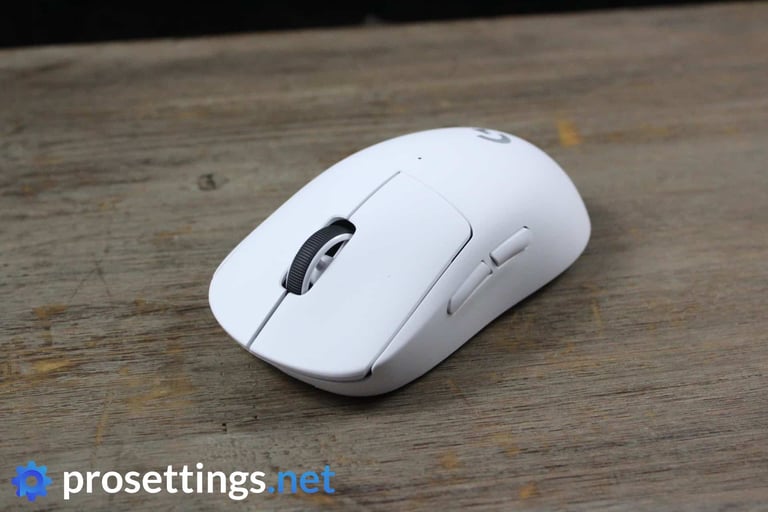
If I’m nitpicking (which I am; I’m a reviewer) I would say that there’s a bit of post travel if you press the buttons towards the front and that the main buttons have some side travel, both when they’re ‘loose’ and when they’ve been clicked. On my copy this wasn’t enough to actually bother me but if you press near the front and/or use a lot of force when gaming this could become somewhat of an issue.
The scroll wheel has remained pretty much the same: it’s a skeletonized wheel with a textured rubber ring around it for grip and it feels great to me. The wheel itself doesn’t have a lot of definition between steps, so if you’re someone who wants a very tactile wheel you may want to write that down as a negative but for most people this will do just fine. The fact that it’s easy to press (easier than the wheel on the GPW) is icing on the cake and makes it an overall great scroll wheel in my humble opinion.
The side buttons are extremely easy to distinguish thanks to the large amount of open space between them but some might find these too thin. If you place your thumb near the bottom of the mouse you can’t exactly do a small ‘roll’ onto the side buttons if you know what I mean. For me they’re positioned appropriately but I’m just mentioning it to be complete.
Something that is disappointing is that both of these buttons have a bit of post travel on my copy. This is most obvious when you press the M4 button near the front and the M5 button at the back but those are coincidentally the spots where I tend to use them so that’s a bit of a bummer. It’s not a deal breaker; the travel distance isn’t too big and both buttons actuate with a pleasing and tactile click so I only really experience the post travel when I press them hard in clutch situations or what have you, but this could be tightened up a little.
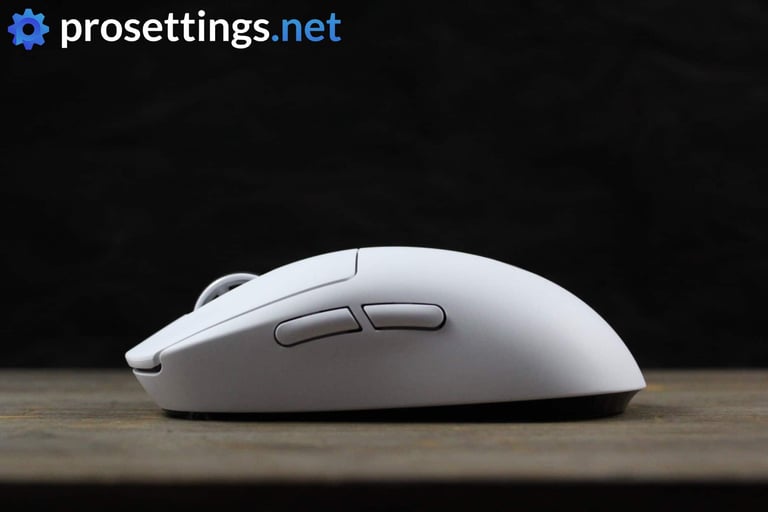
All in all though the click experience is great: I find it hard to image that a lot of people will actually be bothered by the slight side travel, for example, so I’m not saying that this is a glaring issue. You will most likely not notice anything wrong with the clicks of this mouse under normal usage. This is a flagship mouse though, coming in at a premium price point, so I think it’s only fair that I put every detail under a microscope.
Build Quality and Cable
The people at Logitech have really impressed me here: when shaking the mouse vertically (and violently) I can hear a tiny bit of noise near the scroll wheel but under normal usage conditions the Superlight is as silent as a rock.
What’s even more impressive is the fact that the shell doesn’t flex or creak anywhere, except for a bit on the bottom if I press hard enough. I have to admit that I find these kinds of tests a bit superfluous since us reviewers usually (there can be exceptions) have to apply unreasonable amounts of force in order to get that ‘GOTCHA’ moment where a shell flexes and activates a side button or what have you, but I find the ‘flex test’ to be handy to gauge the overall structural integrity of a mouse. And it feels good here. This is extremely impressive for a 62 grams wireless mouse.
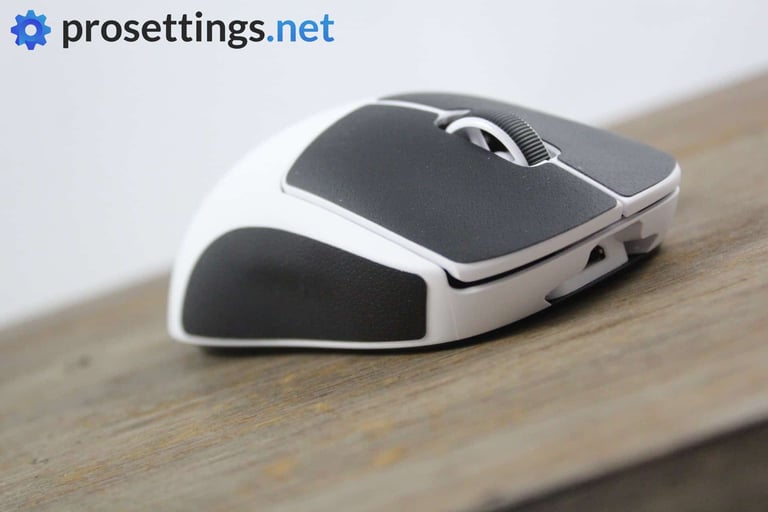
What’s a bit less impressive (at least for some people) is the fact that it comes with a micro USB cable. I personally don’t mind that at all. For keyboards I prefer a USB-C connection since it makes it easier to swap boards, but since I only use the Superlight’s cable to charge it I don’t have a big problem with it being micro USB, doubly so because the connector has ‘prongs’ to it to safely secure the cable to the mouse, which alleviates some of the concerns that micro USB can be a bit of a brittle format.
That said: I don’t have a preference as to what kind of connector they use but I have seen a lot of people being very vocal about USB-C on various message boards, so perhaps it would’ve been a good idea if they opted for USB-C. It’s more modern and there are no downsides to it, so that’s a bit of a missed opportunity.
Sensor and Everyday Performance
I don’t think the HERO (High Efficiency Rated Optical) sensor needs a lot of introduction. Just like many of today’s common sensors it’s a flawless one, meaning that it tracks all of your movements with pixel perfect precision without introducing annoying stuff such as smoothing or angle snapping. I say it time and time again in my reviews: the age of flawless sensors has long been upon us, so if you get the G Pro X Ultralight you won’t have to worry about it spinning out or going rogue on you. Miss that headshot on a stationary enemy and it’s all you.
In Logitech’s G HUB software you can do the usual stuff such as setting the polling rate, creating macros, assign buttons, and change the DPI. What’s new here is that the DPI of the HERO sensor goes all the way up to an astronomically high 25600. Just for fun I set the mouse to that highest setting and I had trouble even getting it back to my regular 1600. It seems like companies aren’t done with the DPI arms race, and while I truly don’t get why anyone in their right mind would use this mouse at 25600 DPI it’s not like it hinders the mouse so I guess it’s all good. And who knows, perhaps this one ends the DPI wars for good.
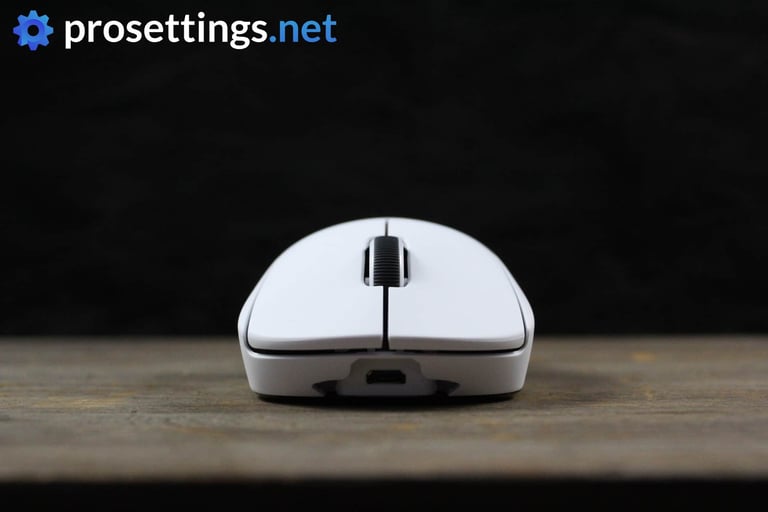
As all of Logitech’s premium wireless mice this one uses their LIGHTSPEED technology. That was the first mainstream flawless wireless tech on the market, and it still works absolutely beautifully today. I’ve used the GPW as my main mouse (with some small breaks) for about two years and I never had a dropout or felt like the mouse was lagging behind: this truly is as good as a wired connection.
Of course wired mice have the advantage that they don’t need to be charged, but with a battery life of around 72 hours this is a mouse that won’t have to be plugged in all that often. I used it for days on end (complete with some pretty long gaming sessions) and the battery level wasn’t even below 50% yet. Again: that’s seriously impressive. I didn’t test whether or not those 72 hours that Logitech states are precisely correct, but rest assured that you won’t have to be charging every night, even if you’re a professional gamer.
Logitech G Pro X Superlight Review – Conclusion
This is a highly anticipated mouse, and I think the number one question that’s on a lot of minds will be ‘is it worth the upgrade?’ Well, it depends. If you’re perfectly happy with your GPW and you don’t care about the weight so much then I’d say stick with what you have. Yes, the feet on the Superlight are better but those can be swapped out on the regular GPW, and aside from the weight and the feet the differences are minimal.
Now that I answered that question I’ll speak about the mouse itself: it’s seriously impressive. Over the past couple of months there’ve been a lot of companies who have had a go at the G Pro Wireless to the point where there are now a variety of alternatives on the market that are at the very least just as good, but the G Pro X Superlight proves that the people at Logitech haven’t lost their mojo.
The G Pro X Superlight will not be the landscape-changing bombshell that the G Pro Wireless was (that one had the advantage of being the first really good wireless gaming mouse) but it’s a logical update. The lighter weight and PTFE feet give the mouse a more modern appeal, and while it’s now the lightest wireless mouse on the market (that I know of) there are a number of competitors out there that deserve a look as well if you’re after a wireless mouse.
On a technical level this is one of the most impressive releases I’ve seen in months though, and if you’re looking for an ultra lightweight wireless mouse with a safe shape this is a top option.
This product was received for free from the manufacturer and given to our reviewer to test and review. Brands and manufacturers have no editorial control over our reviews. For more information, check out our review FAQ.


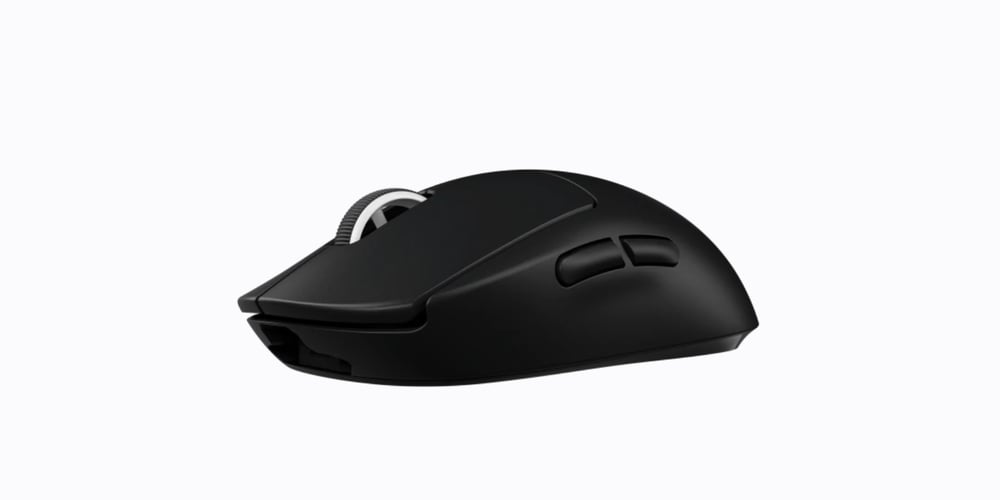






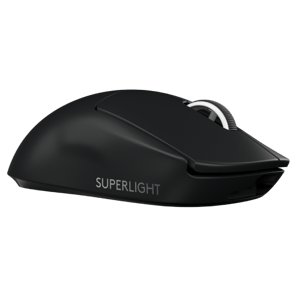

is this mouse worth in 2024?
The Superlight 2 has been out for a while now, but the sensor and tech behind the G Pro X are still very much up to today’s standards. It doesn’t have optical switches, but aside from that it’s a great option still. It’s definitely not the most technologically advanced mouse on the market anymore, but if you like the shape/design you can rest assured that it won’t hold you back technologically.
What encoder is installed in this mouse ?
Should be a TTC White/Silver.
Can double clicks appear on this mouse after a while?
Yes, the Superlight uses mechanical switches, so it could develop double clicks after some time.
Does electronic use gpxsuperlight’s bottom cover?if he use,it is plastic or ptfe he use
please tell me
Unfortunately we don’t have that information, sorry!
🙁 can you ask him for me plz?
my palm is 21×9. will I be able to play on it?
You should, yeah. Depending on your grip, of course. If you like a lot of palm contact, for example, the mouse might be a bit too small for your hands, but for fingertip grip or a claw grip with relatively little palm contact it should be fine.
So I currently have a wired razer viper and have never used a wireless mouse before. I was wonderIng if I should transfer to the g pro super light while it’s on sale, do you think it’s worth it to try a wireless mouse?
A wireless mouse is 100% worth it if you ask me. I am not completely against using a wired mouse like some people are (nothing against them; opinions vary) but I do find myself gravitating towards wireless mice more easily these days. No matter how good a cable is, it just feels great to not have to worry about it at all. If you like your Viper and want to go Wireless you could also look at the Viper Ultimate or Viper V2 Pro, by the way. Just a tip!
hi pro settings, i want to know why all the pro players playing with the white one and not the black ??
what’s the difference between them ? does the white one glide better ?
i think its bc they prefer white over black
if they prefer the white over the black that mean there is something different
There is no difference between the two aside from the look of the coating. Could just be a preference thing as a white mouse of course pops a bit more. It might also be so that Logitech sends them white mice when they request them because it’s easier to recognize on player cams and what not, but that’s not confirmed and just me theorycrafting. But there’s no difference between the two versions!
Lmao here we have Viper V2 Pro Ultimate, and the dpi is 30k.
will logitech release Hero 32k?
You do aware hero 25k is always just a hero 16k,and any CPI over 5000 sensor will start to lose it’s accuracy(machine error),let alone you’re gonna have shit alot more human error play with high sens,right?and V2 pro is just V2 pro,Pro means less feature less weight more competitiveness,Ultimate means alots of feature,saying V2 Pro Ultimate is literally just oxymoron.
Here’s what logitech wrote to me:Good afternoon! If the button works correctly, you can ignore it. Otherwise, you should contact the store at the place of purchase.
I recently bought this mouse and it really is the best of the best. BUT the side buttons are a bit recessed. Especially the front (MOUSE5), and when I press them, they almost enter the case. The front a little more and will enter the body. I don ‘t know if it ‘s a marriage or is it normal ? Is it even possible to use the side buttons in this situation, they are convenient for me and I use them often. But I don’t know what to do in this situation, maybe it’s normal and I’m just paranoid or it’s a marriage 🙁 .And I still don ‘t know what is better to play with or without a lid ? There is a difference in the feeling, but I don’t know what is still better. But in general, the side buttons are very good, except for what I described at the top. Please answer my questions. Thank you very much
I choose between GPX and GPW. I have a palm grip. In my country, GPX costs $170 and GPW costs $130. Both mice are good and I do not know which one to buy, my friend has two mice and he said that GPW has the best material and build quality (he bought both mice 2 months ago). so I think maybe GPW will be better and cheaper. Yes, and all the advantages of GPX, let’s say the weight will be the same for me, I mean, right now my mouse weighs 105 grams, and when I switch to GPW, let’s say I’ll still feel light, so 80 grams or 60 for me will be light in weight. As a result, GPW is cheaper (significantly for me) and + – they are the same, but in my opinion and the opinion of a friend, the material and build quality in GPW is better. What do you say? I’m also looking at Viper ultimate, it’s not really suitable for palm grabbing, but it’s also very good. It costs about the same as GPW. What do you recommend for palm grabbing? I’m just not sure if it’s worth overpaying $50 for 63 grams. After all that I have written, advise me what would be better, whether it is worth paying $ 50 extra for the sake of a weight of 63 grams. But the build quality and materials will be worse than in GPW. In principle, I am ready to overpay, but is it worth it?
My palm is 17-18 cm long, 8 cm wide. Will this mouse be convenient for me for palm grip?
I think gpx is still worth the money. In the end, I chose gpx because of the weight, and many pro players use gpx, not gpw. In shape, it suits me (I have a palm grip, the palm is 17-18 cm long, 8 wide)
I wouldn’t say that the build quality of the G Pro Wireless is better than what you find on the G Pro X Superlight. They’re very much the same in that regard (ignoring individual QC errors of course) but if you don’t mind the weight of the GPW as much (as you said: it’s not like the GPW is a heavy mouse at all) I would advise you to save the extra money and just go for the GPW. The GPX is a fantastic mouse and has a number of other (smaller) advantages over the GPW, but the main draw is in the weight reduction if you ask me. If that doesn’t matter too much for you then by all means go for the GPW I would say.
Thanks ! But I thought about it and decided to take gpx anyway. I want to feel a really light mouse, and it’s perfect for my white setup.
I want to buy a mouse soon, and I do not know what to choose. I choose between G pro x superlight and xm1r. For me, it is important in the mouse: a good response of the main buttons, preferably not too much weight, preferably not too expensive. I like the Xm1r because it has a good reaction, 70 grams weight, kaliah 8.0 switches and it’s not that expensive. I like the G Pro x Superlight because it’s wireless, lightweight, and responds better to basic buttons. So I’m facing a difficult choice, please tell me which of these mice to take
Judging by your options the XM1r seems to be the best option for you. It’s not all that heavy (so lightweight is covered), it’s not all that expensive, and has great buttons. The GPX also has all of that of course, but it’s more expensive of course, so in that sense perhaps the XM1r is your best bet. That said: they both have quite a different shape (with the XM1r feeling a bit flatter and wider) so take notice of that, too. Shape is the most aspect of a gaming mouse, so do make sure that it fits you!
G Pro x superlight or deathadder v2 pro?
They’re both very different mice, even in their shape. I would take the Superlight because the DA v2 Pro is slightly too large and flat for me, but that’s purely subjective. Objectively they’re both insanely good mice, with the G Pro having the obvious advantage that it’s much lighter. But one is ambi (GPX) and one is ergonomic (DA v2 Pro) so they couldn’t really be any more different. It all kind of depends what you prefer when it comes to shape. Even if you’re using a mouse with all of the top tier specs: if the shape isn’t for you then you’re not gonna enjoy it very much. That said: for me, personally, I’d go for the G Pro X.
Hi pro settings i want to know if pro players like s1mple and Electronic does use the replacement ‘puck’ that has a skate attached or they just play with the original one without skate ??
In the video of s1mple giving his major winning mouse to James Banks I thought I saw him use it without the glide skate attached, but really it’s just down to preference. One won’t make you better than another, you just have to go by what you feel works for you.
Height not “4.96 cm” you scare me lmao. Logitech is bad but sadly no alternatives… I modded hard one cheaper mouse and it’s not that bad, but i’m afraid i’d go for this one anyway… Wanna get Shroud Edition lmao…
Thanks for noticing, I’ve corrected that typo! I don’t really see how Logitech is ‘bad’ though. There is no perfect mouse out there and not every mouse will work for everyone but the G Pro X isn’t what I would call a bad mouse at all, at least not when looking at specs that one can judge objectively. In any case: hopefully you enjoy the Shroud Edition! I just reviewed that one and it’s a banger, though the safe isn’t very safe.
do you think its a good idea to switch from g502 to G pro superlight
It depends. If you love the shape of the G502, for example, you might be better off looking for something ergo for example. If you want a lighter (and wireless) mouse with a safe shape then the G Pro (X) is a very good bet with its ‘one size fits all’ type of shape. That’s not to say everyone will love the shape but it’s a relatively risk-free shape so yeah. For shooters I personally find the G502 to be too heavy (though that depends on personal preferences too) so if you’re going to be focusing on being competitive I can definitely recommend looking at lighter alternatives, though there are plenty of options aside from the G Pro X of course. If you have any more questions (or you want to share your hand size/grip style/preferences/what have you I can give some slightly more targeted recommendations) feel free to let me know!
Can I use this mouse for fingertip grip bro? my hand is 18×10, I know this is complicated but ur point of view gonna help me so much
It’s got a safe and neutral shape and it’s very light so you should definitely be able to fingertip grip it if you ask me. There’s nothing that indicates that it would be a bad fit for you, unless you don’t like the shape or what not, but I can’t judge that of course.
I was thinking of getting a new mouse, do you think i should go for the gpx superlight or the xm1r, which one do you prefer ? do you think the gpx superlight is worth the money because its worth a lot, can the xm1r be as good as the gpx ?
It really depends on your preferences. The XM1 is a fantastic mouse and a lot of people love its shape for claw gripping especially but for me it’s just a little bit too wide at the back even though I use claw. That said: the GPX has a bit more of a ‘general’ type of shape. It suits a lot of people but isn’t exactly specialized at one thing, so if you’re looking for a very specific type of shape then that might be a problem too. Aside from the wireless aspect I would honestly put both mice on the same page as far as the overall quality goes so I’d definitely say that the XM1r can be as good as the GPX. As far as ‘worth it’ goes it comes down to what your opinion on wireless is. If it’s a must then the GPX is worth every penny but if you don’t mind a (good) wire then there are mice such as the XM1r that offer a better value. I’d honestly just take a look at how wide you’d realistically want a mouse to be, and look at some photos of both mice, since shape is such an important factor with these things and a highly subjective one at that.
i ordered this mouse for rainbow six siege, i hope this mouse is just not for crosshair games like valorant or csgo, im just kinda worried cus im switchin from a ec2a zowie and it weighs 30-40 grams more it will be weird for me i guess for the first days
The weight (and shape) difference will definitely take some time to adjust to. How long that takes honestly depends from person to person, but if you like the shape (that’s something that you know after only a couple of hours of gameplay from my experience) you should get there eventually. Have fun with it!
In your opinion which one do you prefer zowie S2 or the gpx?
In my opinion the S2 has the better shape but I like pretty much everything else about the GPX better: it has the better coating, better stock feet, it’s wireless, and it’s lighter. The weight of the S2 doesn’t exactly bother me to be fair but I do prefer a wireless mouse these days if I can choose. For these reasons I would personally pick the GPX over the S2, but the S2 does have a fantastic shape if you ask me so it’s hard to really say which one is better, seeing as shape is so important.